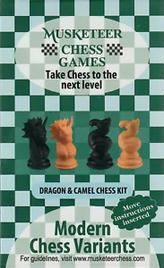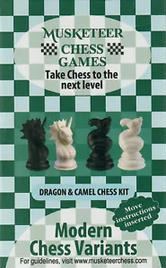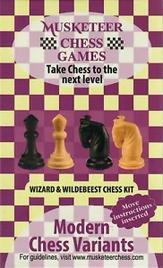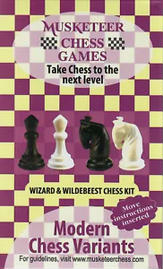Wildebeest Chess
In his very nice book New Rules for Classic Games, R. Wayne Schmittberger gives the rules and backgrounds of his large chess variant Wildebeest Chess. One of the design purposes of this variant was to balance the number of riders (pieces like rook and bishop) and leapers (pieces like the knight).
The game was regularly played in NOST. It can currently be played with Jocly, on Game Courier, as a Java applet, with ChessV, and with Zillions-of-Games.
Setup
|
promoChoice=WQ
symmetry=rotate
satellite=wizard
files=11
ranks=10
graphicsDir=/graphics.dir/alfaeriePNG/
graphicsType=png
whitePrefix=w
blackPrefix=b
lightShade=#EEEECC
darkShade=#226822
rimColor=#FFFFF0
coordColor=#000000
squareSize=50
firstRank=1
borders=1
useMarkers=1
Pawn:P:fmW*fceF:pawn:a2,b2,c2,d2,e2,f2,g2,h2,i2,j2,k2,,a9,b9,c9,d9,e9,f9,g9,h9,i9,j9,k9
Knight:N:N:knight:b1,j1,,b10,j10
Bishop:B:B:bishop:c1,d1,,c10,d10
Rook:R:R:rook:a1,k1,,a10,k10
Queen:Q:Q:queen:e1,,g10
King:K:KisO1isO2isO3isO4:king:f1,,f10
Camel:C:C:camel:h1,i1,,c10,d10
Wildebeest:W:CN:wildebeest:g1,,e10
royal=6
stalemate=draw
enableAI=2
|
The game is played on a board of ten rows and eleven columns. Each player has eleven pawns, two rooks, two knights, two bishops, two camels, one queen, one wildebeest, and one king.
The opening setup is as follows.
White:King f1; Queen e1; Wildebeest g1; Rook a1, k1; Knight b1, j1; Bishop c1, d1; Camel h1, i1; Pawn a2, b2, c2, d2, e2, f2, g2, h2, i2, j2, k2.
Black:
King f10; Queen g10; Wildebeest e10; Rook a10, k10; Knight b10, j10; Bishop
h10, i10; Camel c10, d10; Pawn a9, b9, c9, d9, e9, f9, g9, h9, i9, j9,
k9.
Pieces
Kings, queens, rooks, knights, bishops, and pawns move as in orthodox chess, with the following modifications. Castling is with the same restrictions as in orthodox chess - but the king may move one, two, three, or four squares in the direction of the rook; the rook jumps over the king to the next free square. Pawns may move one, two, or three squares when on the second row, and one or two squares when on the third row. On all passed squares, the pawn can be taken en-passant. Pawns promote only to queens or wildebeests.
A camel has a kind of extended knight jump: it goes one square in one direction and three, not two, in the other. Thus, a camel on a1 can go to b4 or to d2. Camels may jump (like knights) over occupied squares. Thus, for instance, white can start with moving his camel from h1 to g4.
A wildebeest has the combined moves of a camel and knight.
Rules
Apart from the differences in pieces and setup described above, the only difference from Chess is that stalemating your opponent also counts as a win.
Equipment
The extra pieces for this game are available in two different Musketeer Chess brand chess variant piece kits. Each set has one of each color. So, this game would need two Dragon & Camel sets and one Wizard & Wildebeest set.




The board may be pieced together from cut-up mousepad style boards, as described on the Chess Variant Construction Set page.
Written by: Hans Bodlaender. Updated by Fergus Duniho
WWW page created: February 5, 1997.
